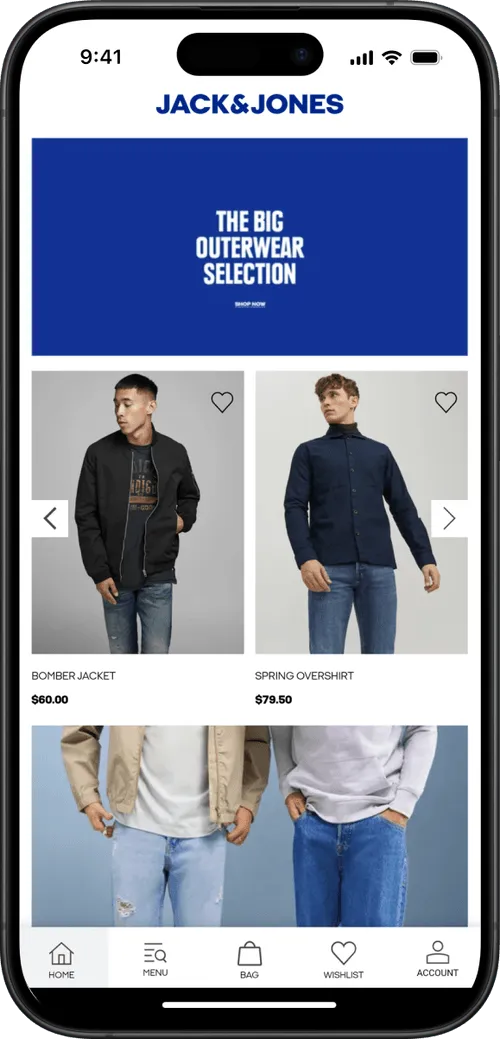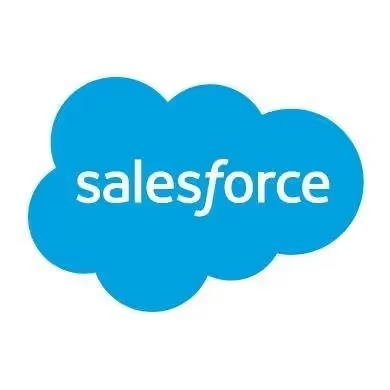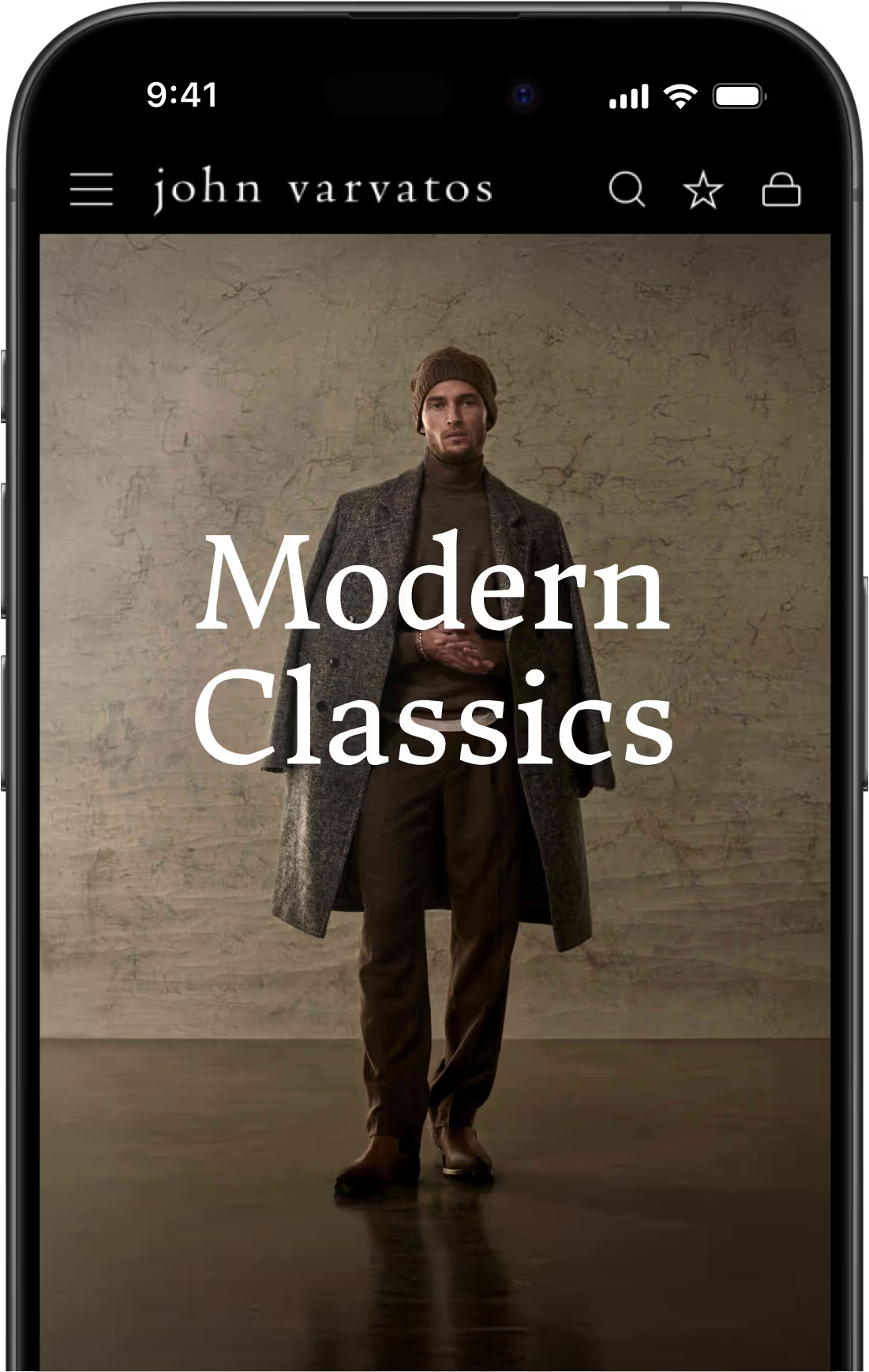Brands with mobile apps win more loyal customers. Apps drive higher spend, more frequent purchases, and deeper brand advocacy than the web alone.
With rising CACs, shrinking margins, and declining effectiveness of channels like Meta and email, having a dependable app (and the VIP customer base it builds) is crucial.
In this guide, we’ll show Salesforce Commerce Cloud (SFCC) merchants how to launch a fully branded, fully integrated mobile app. You’ll see the main approaches available, and which one offers the clearest path to ROI.
Can You Create Mobile Apps With Salesforce Commerce Cloud?
SFCC has a lot of powerful tools. But among these tools, they don’t have a reliable way to launch your site as a native mobile app.
You have composable commerce features that let you reuse parts of your store in a mobile app. And Salesforce Commerce Cloud has two APIs (the legacy Open Commerce API (OCAPI) and the newer B2C Commerce “Shopper” API (SCAPI)) that allow you to share data between your Salesforce backend and your mobile app.
But you need to build the native architecture for the mobile app separately, and configure the synchronization between web and app yourself, which is not ideal for lean teams focused more on product development than tech.
How to Build a Salesforce Commerce Cloud Mobile App
Broadly speaking, SFCC brands have four main routes to launch an app:
- Progressive Web App (PWA) – enhancing your site for installable web use.
- Cross-Platform (React Native / Flutter) – a single codebase for iOS and Android.
- Headless – decoupling SFCC backend and building a dedicated mobile frontend.
- MobiLoud – a managed service that converts your existing SFCC storefront into native apps.
The table below breaks down the key features of each approach:
Now, let's dive a little deeper.
Progressive Web App (PWA)
PWAs let customers “install” your site from the browser. They’re quick to build and maintain because they're built on your existing web code.
But, like the name suggests, a PWA is a web app. It's not an adequate substitution for a true mobile app.
You can install a PWA to the home screen, but it's not as easy as a one-click download from the App Store. You can send push, but it's web push, limited and less effective than native push.
PWAs are a nice enhancement for your web experience, but they’re not a replacement for a native mobile app.
Cross-Platform (React Native / Flutter)
Frameworks like React Native and Flutter let you build real iOS and Android apps from a single mobile codebase.
This gives you access to native features and strong mobile performance, at lower cost than building separate, fully native apps for iPhone and Android.
The trade-offs? You’re still building a whole new frontend, re-implementing integrations with SFCC APIs (OCAPI/SCAPI), and maintaining it indefinitely as a second codebase.
Even with cross-platform efficiency, the time, cost, and maintenance burden is prohibitive for most ecommerce brands.
An option, perhaps, if you have a deep dev team and a lot of resources to put towards your mobile app. But if you want to stay lean, custom development (even through React Native/Flutter) is not the right choice.
"If we had unlimited time and money, we would probably go for a custom native app, but that is half a million to a million a year to maintain."
- David Cost, VP of Ecommerce & Marketing at Rainbow Shops
Headless
A headless architecture decouples your SFCC backend from your storefront, exposing APIs that can power web, app, kiosk, and more.
A mobile app frontend is then built on top of those APIs, which lets your customers download your store to their phones.
This is somewhat similar to creating a custom app. You're working with multiple front ends, and while it's perhaps a more flexible long-term option than just building a fully separate React Native/Flutter app, it comes with a lot of upfront cost and complexity.
You need to architect, build, and maintain both the API layer and the app frontend. It may make sense for enterprise brands investing in multi-channel ecosystems to go headless and build a separate native app. But it’s overkill for most.
MobiLoud (Fast, Managed App Development)
MobiLoud is the ideal solution for Salesforce Commerce Cloud stores to launch mobile apps. You get fully native iOS and Android apps, powered by your existing website, with minimal resources required.
No API reimplementation. No mobile dev work. No loss of features. Everything on your website works in your app.
- No APIs. All your cartridges, content slots, custom flows just work, without custom development.
- Launch in weeks, not quarters.
- Cost starts at $799 – not six figures.
- Keep your full stack: ERP, OMS, CRM, analytics, and any other key integrations from your website. Everything works in your app as well.
- Works seamlessly with multi-storefront setups (multi-language, multi-country, etc).
- Fully integrated, native push notifications built in.
- Your website powers the app, so you only have to maintain one codebase, for minimal maintenance and lift.
- Full-service partner. Not just a tool. We’re fully committed to your app’s success.
Is the best option for SFCC brands that want the benefits of a real app, without derailing their roadmap or rebuilding what already works.

We've helped brands like Jack & Jones, Vero Moda, John Varvatos and many more launch low-maintenance, high-performance mobile apps by converting their existing website.
It's the best way to go live with a risk-free, on-brand mobile app, with minimal lift - so you tech team stays lean.
Want to see what’s possible? Get a free preview of your app now.
Why MobiLoud Is the Ideal Salesforce Commerce Cloud Mobile App Builder
You could build a custom app, integrated with your website. But then you’re looking at $250K+ to build, and potentially the same (some brands quoted $500K-$1M) per year to maintain.
At that cost, the business case is just not worth it.
MobiLoud is faster, more affordable, and significantly easier to manage. And the tradeoff in functionality is barely noticeable – if at all.
1. Native Apps Without Rebuilding Your Store
MobiLoud takes everything from your website and repackages it within a fully native container.
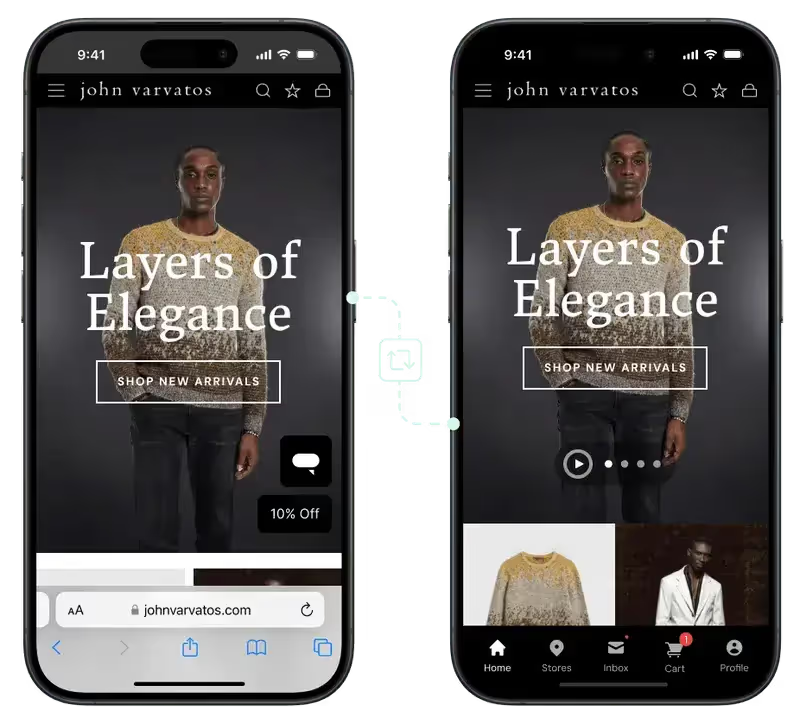
If your Salesforce Commerce Cloud site already delivers a great experience on the mobile web, you’re 90% of the way to having a world-class app. MobiLoud bridges the final 10%.
MobiLoud:
- Preserves full parity with your custom SFCC build, including cartridges, controllers, and third-party scripts
- Gives you native app navigation, deep links, and push notifications
- Lets you maintain everything from one place: your existing web stack
If it works on your mobile site, it works in the app. No refactor, no stripped-down “template app.”
2. No APIs or Middleware Required
With MobiLoud, there’s no need to configure OCAPI scopes, manage SLAS tokens, or reimplement cart and checkout flows.
This is a major project when you build natively. It takes significant dev hours and adds major complexity to your tech stack, which you’ll pay for, up front and in the future.
MobiLoud ensures that all the backend logic from your website works seamlessly inside the app.
That means:
- No risk of broken features when Salesforce’s API changes
- No updating your app for each Salesforce update
- No duplicate business logic across platforms
- No “what version are we using?” headaches
- No rate limits, edge latency, and token expiry
You skip the entire category of work most mobile app projects spend months on.
3. Keep Your Full Salesforce Stack & Integrations
Unlike API-driven apps that require new integrations, MobiLoud keeps everything where it is:
Your ERP, OMS, CRM, Analytics and event tracking, all fires through the same data layer.
Loyalty programs and customer segments still apply as-is. Page Designer, content assets, Einstein personalization all carry over.
You don’t need to “sync” anything. Your app and your site are always in sync, by design.
As a rule of thumb, if it works on your site, it’ll work in your app.
4. Optimized for Performance & Headless Architecture
If your SFCC storefront is already headless or heavily optimized for speed (edge rendering, CDN caching, etc.), MobiLoud brings those gains straight into the app.
No extra calls to SCAPI. No unnecessary render layers.
That means:
- Instant-load product pages
- Seamless navigation and transitions
- Performance that rivals (or beats) most native custom apps
If your website is fast and performant, your app will be too.
5. Hands-Off: We Build and Maintain It for You
MobiLoud is your app partner. You don’t need to hire and manage app developers, or spend time trying to figure out a new platform.
We handle the build, testing, and publishing to the App Stores. We also handle technical updates and maintenance for your apps, making sure nothing breaks when iOS updates.
We’ll also actively work with you to grow your apps. We help you with your launch strategy, setting up crucial push flows, and steering you towards the results we’ve seen other brands like yours get from their mobile apps.
By taking work off your plate, we ensure the app drives clear ROI, not just adding another thing for you to worry about.
How to Launch a Salesforce Commerce Cloud Mobile App with MobiLoud
We can help you go live with your Salesforce Commerce Cloud mobile app in just a few weeks.
Here’s what the process looks like.
1. Free Consultation & Tech Fit Call
We’ll start off with a consultation call. We want to know what you want out of your apps, and any specific questions you have about the process.
We’ll also make sure MobiLoud is a good fit for you, and that everything is aligned for you to have a successful launch.
2. We Turn Your SFCC Site into Native Apps
Our team takes care of the build for you.
We construct the native architecture for your apps with Swift/Kotlin, and use our own process to bring your website to life in the apps (which includes UI additions that give a proper native experience).
3. End-to-End Testing & QA
In a couple of weeks, you’ll be able to test your apps.
You’ll get links to download and play around with them on your own devices. You can share any feedback on the initial build with our devs.
We do our own QA as well, helping ensure your apps go live with no bugs or usability issues.
4. App Store Submission (iOS & Android)
Finally, we put together the final build and submit to the App Stores for approval.
We’ve published thousands of apps to iOS/Google Play, and have the process fully ironed out to minimize delays.
5. Post-Launch Growth & Support
Typically in around four weeks, your apps will be ready and live.
We’ll work with you to grow your apps, helping you set up assets on your website to convert site visitors into downloads, as well as implementing push notifications.
Ready to learn more? Get a free preview of your app now.
SFCC Brands that Trust MobiLoud
MobiLoud has helped numerous Salesforce Commerce Cloud brands launch their own mobile apps, where other options (“simpler” app builders and expensive custom development) fell short.
John Varvatos (Luxury Fashion)
Luxury menswear brand John Varvatos has 20 physical stores, a bespoke website (built on Demandware, part of the SFCC platform), but only a lean development team.
They wanted to launch an app, but didn’t have any experience with mobile app development, and didn’t want it to be a project that took all their team’s time to manage.
We helped them build an app that acts as a home for their VIP customers, who spend 10x as much as their average customer. They average 12x more sessions per app user, 3.6x longer average session duration, and 10% higher AOV.
All this with basically no overhead, and an app that fully reflects their fine-tuned web experience.
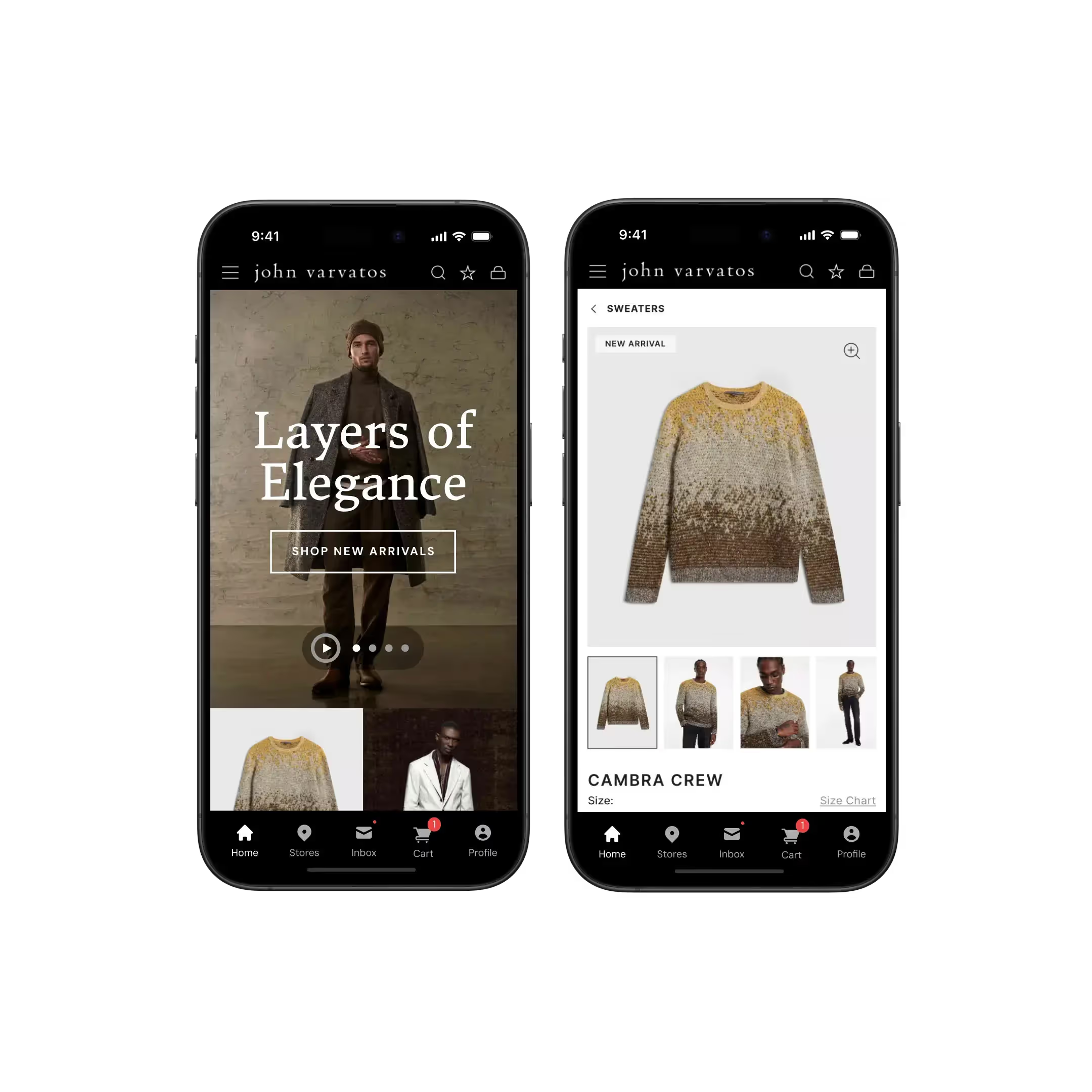
Read more about John Varvatos’s mobile app
Bestseller (Global Apparel Brands)
Bestseller operates over 20 individual fashion brands, including JACK & JONES, ONLY and VERO MODA, with 2,800 branded retail stores across 44 countries. Their online presence serves 75 markets across Europe, Asia, North America, South America, Oceania and the Middle East.
Their Salesforce-powered websites are intricately constructed, require optimum performance, and serve multiple countries and languages.
They trust MobiLoud to build and maintain their apps, for multiple brands. They found MobiLoud saved significant time and cost compared to their previous solution (native, API-driven apps).
They also found no difference in quality between MobiLoud’s solution and the apps that cost them six figures per year to maintain.
"Through history we’ve tried doing what MobiLoud does. But we wanted a solution that could enable push notifications, and MobiLoud has a way of doing that with Onesignal. We couldn’t find another company that could offer the same features at the same price point, same time to market, and make it as easy as MobiLoud could."
- Svend Hansen, Product Owner at Bestseller

Read more about Bestseller’s mobile apps
Final Thoughts: A Smarter Way to Build Mobile Apps with Salesforce Commerce Cloud
Now is the perfect time to launch your own app.
Your brand needs a reliable, low-cost way to engage your best customers. Launching an app lets your brand live on your customers' home screen, with low-cost push notifications to get their attention at any time.
MobiLoud is the easiest, most affordable way to turn your SFCC site into a mobile app, without losing anything that makes your website great.
Our team handles everything for you, so you can focus on your business, while your apps grow revenue, build trust, and strengthen your brand authority.
It’s risk-free - just the cost of a single day’s sales to create a powerful brand asset that gives you control and a direct line to your audience.
Get started today!
Book a free consultation with our team to see if MobiLoud is the right fit for your store.
Frequently Asked Questions (FAQs)
Does it support Page Designer, Einstein personalization, multi-site?
Yes. Because the app renders your existing storefront inside a light native shell, every Page Designer component, Einstein recommendation block and multi-site catalog you already use on SFCC works exactly the same way in the app. No extra integrations or rebuilds needed.
What if we’re using a headless architecture or React frontend? Is that supported?
Absolutely. MobiLoud is platform-agnostic and already powers apps built on React, Vue and other headless front-ends. It simply wraps whatever you serve to mobile web visitors (you can also set up pages that only show in the app for app-exclusive experiences).
How are payments, 3-D Secure, and Apple/Google Pay handled?
Checkout continues to flow through your existing SFCC pipelines, so all current payment methods (including Apple Pay, Google Pay, 3-D Secure and your PSP tokenization) are automatically integrated. Nothing new to certify or maintain.
What happens when Salesforce or iOS 19 changes something?
Our team monitors OS updates, shipping any required updates to your apps should Apple/Google demand it. And when Salesforce updates, your app will show the up to date version the same as your website. There are no APIs to manage or custom updates needed.
Will the app stores take a 30% cut from our sales?
No. Physical goods, services fulfilled offline and most click-and-collect orders are exempt from Apple/Google in-app purchase rules. So the revenue still settles through your normal SFCC checkout provider.
What happens if our website is updated? Does the app need to be re-submitted?
Site changes appear in the app instantly because the app is powered by your live storefront. You only push an update to the app when you want to alter native elements. MobiLoud handles the app store submission for you.
Can we customize the app navigation, tab bar, and loading screens?
Yes. Native UI elements (tab layout, header actions, splash screen, icon, colour palette) are all configurable and can be updated post-launch through our dashboard.
Can we show app-exclusive banners or product drops?
Yes! Simply tag those sections or URLs to show only in the app and hide on mobile web. MobiLoud lets you create “app-only” promotions with some simple setup in your SFCC backend.
Can we test new features or UI flows in a staging environment before pushing live?
Yes. If you need it, we can spin up a separate staging build that points to your sandbox or staging domain as an option add-on.
Will our analytics platforms (GA4, Adobe Analytics, Heap, etc.) still track app behavior?
All the tags, GTM containers and datapoints you already fire on the site fire inside the app too, so your dashboards continue to work out of the box. We’ll add a simple snippet of code that identifies mobile app users, so you can easily see where sessions and sales are coming from.
Who handles submission to the App Store and Google Play?
We take care of app store submission for you. Our team prepares the screenshots, descriptions, compliance checklists and back-and-forth with Apple/Google until your binaries are approved.
Will we have to manage app updates, or is that handled for us?
No. MobiLoud owns ongoing maintenance, OS compatibility changes and store resubmissions. Your content and integrations stay synced automatically, so you effectively manage the app as you maintain your website. No duplication of work.
How much does it cost to build and maintain the app?
Plans start at $799 per month on our growth plan. Pricing scales based on requirements, contract terms, and active users on the app. There's no revenue share, no success fees.
There's also a one-time setup fee, typically $1,500, to cover the initial build & publishing to the app stores.
All of this comes with little to no lift from your team. No need to manage your app separately, no paying freelance developers or keeping devs on staff at $50+ per hour.
Still have questions? Book a free consultation with one of our project managers today.
